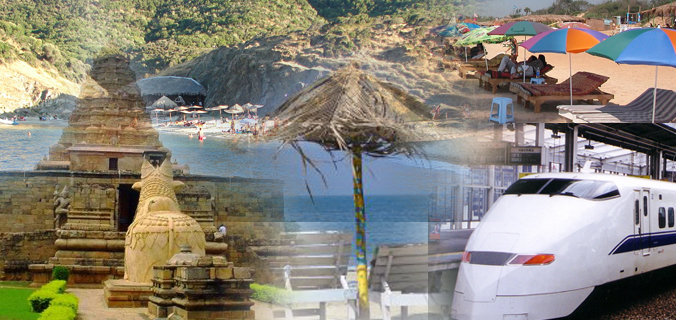Discover Hospitality and Tourism Management Courses: Eligibility, Scope, and Career Pathways
Emma, a passionate traveler, has always dreamed of turning her travel exploration into a bright career. She wanted to work in an industry where adventure and Hospitality coincide and create unforgettable global user experiences. To help her unravel the confusion, this statistic might be suitable for the aspirants like her!
Global Tourism contributes roughly 10% of the global GDP and actively employs 348+ million people. The Hospitality and Tourism industry serves as a gateway to exciting career opportunities!
From Hotel Management to Travel Planning, this blog explores the best Hospitality and Tourism Management Courses, their eligibility, scope of career, and future trends to help you step into this dynamic field.
What is Hospitality and Tourism Management?
Hospitality and Tourism Management mainly focuses on providing exceptional traveler service delivery. These include accommodation, food, entertainment, and transportation. The main goal of this sector is to ensure people’s comfort and ensure they have enjoyable experiences while exploring new destinations or going on business travels.
Hospitality covers various sectors, including hotels, restaurants, event planning, and customer service. This industry plays a crucial role in economic growth, cultural exchange, and social development on a global scale. Moreover, as Tourism continues to expand, it creates numerous job opportunities, boosts regional businesses, increases the educational standard for courses like Master in Hospitality Management, and supports infrastructure development for local people.
Hospitality vs Tourism Management: Key Differences
Hospitality and tourism are industries that are closely linked and work in tandem to provide enjoyable travel experiences for guests as well as tourists. Here are their key differences:
a) Focus
- Tourism: Mainly involves people visiting attractions, activities, and events.
- Hospitality: Mainly focuses on accommodation, food, travel, and other customer services for the guests.
b) Purpose
- Tourism: Encourages new places exploration for people and leisure or business culture.
- Hospitality: Ensures traveler’s comfort and convenience by offering quality services.
c) Services Provided
- Tourism: Typically includes sightseeing, adventure activities, heritage tours, and cultural experiences.
- Hospitality: Majorly covers hotels, restaurants, transport, resorts, and entertainment settings.
d) Industry Connection
- Tourism: Depends on Hospitality services to enhance the overall travel experience.
- Hospitality: Supports Tourism by ensuring that travelers have a pleasant and comfortable stay.
e) Economic Contribution
- Tourism: Generates revenue through attractions, travel bookings, and tour packages.
- Hospitality: Contributes through hotel stays, dining, and other service-based expenditures.
f) Customer Experience
- Tourism: Focuses on creating memorable experiences through destinations and events.
- Hospitality: Ensures customer satisfaction through high-quality service and guest care.
g) Dependency
- Tourism: It can exist without hospitality, but quality hospitality enhances the tourism experience.
- Hospitality: Relies on Tourism for a steady flow of guests and business growth.

Popular Hospitality and Tourism Management Courses
With increasing global travel and a growing high-quality service demand, pursuing a Hospitality or Tourism Management Course can open lucrative doors to exciting job prospects. Check the below table for the most popular Tourism And Hospitality Courses:
Undergraduate Courses (After 12th)
Undergraduate Hospitality and Tourism Management Courses provide essential skills for students in hotel operations, Tourism management, and customer service. Listed below are the most prevalent Undergraduate Courses among candidates:
BA in Hospitality & Tourism Management
| Feature | Details |
| Course Name | Bachelor of Arts in Hospitality Management |
| Duration | 3 years |
| Key Topics Covered | Mainly hotel management, airline services, sales, food and beverage management, catering, housekeeping, spa and wellness services |
| Focus Areas | Event management, organization, customer service, practical training (internships) |
| Work Sectors | Hotels, resorts, exotic resorts, catering businesses, Tourism, healthcare services,, restaurants, |
| Admission Requirements | High school completion with a minimum of 50-60% marks; some universities require entrance exams |
| Common Entrance Exams | UPSEE BHMCT (for colleges in Uttar Pradesh), AIMA UGAT (national-level exam), IHM CET (for hotel management courses in India) |
| Exam Topics | General knowledge, logical reasoning, Hospitality sector aptitude |
B.Sc. in Hospitality & Hotel Administration
| Course Name | B.Sc. in Hospitality and Hotel Administration |
| Duration | 3 years (6 semesters) |
| Key Topics Covered | Hotel management, accounting, customer service, food & beverage management, front office operations, marketing |
| Focus Areas | Hospitality services, event planning, Tourism management, lodging, practical training (internships) |
| Admission Requirements | Completion of 10+2 with English as a subject; some institutes require an entrance exam |
| Common Entrance Exams | JEE for hotel management, NCHM JEE (for NCHMCT-affiliated institutes), university-specific entrance tests |
| Exam Topics | English comprehension, logical reasoning, general knowledge, Hospitality industry aptitude |
BBA in Tourism & Travel Management
| Aspect | Details |
| Course Name | BBA in Tourism and Travel Management |
| Duration | 3 Years |
| Eligibility | 12th completed with at least 50% marks from a recognized board |
| Admission Process | Merit or entrance exams-based like CUCET, AIMA UGAT, DUET, OJEE, JUET |
| Career Opportunities | Travel agencies, tour operations, Hospitality, hotel management, event management |
| Types of Study Options | Full-time, Online, Distance Education |
| Key Course Topics | Tourism Planning, Business & Communication Skills, Customer Service, Global Tourism Trends |
| Why Study This Course? | Growing Tourism industry, high job demand, good salary potential, opportunity for self-employment |
Diploma Courses
Diploma Hospitality and Tourism Management Courses offer practical training and industry-specific skills for students looking to build hotels, Tourism, and travel-related careers. Here are the prevalent Diploma Courses widely popular today:
Diploma in Hotel Management
| Aspect | Details |
| Course Name | Diploma in Hotel Management |
| Duration | 2-3 Years |
| Academic Level | Undergraduate |
| Eligibility | Class 12 Pass with at least 50% marks from a recognized board |
| Admission Process | Merit-based or Entrance Exam (CG PPT, CAT, MAT, XAT, CMAT, ATMA) |
| Top Recruiters | Leading hotel chains, restaurants, travel & Tourism companies |
| Types of Study Options | Full-time |
| Key Course Topics | Hotel Operations, Customer Service, Housekeeping, Food & Beverage Management, Hospitality Administration |
| Why Study This Course? | Growing Hospitality industry, strong job demand, leadership opportunities, hands-on experience in industry |
Diploma in Tourism Studies
| Aspect | Details |
| Course Name | Diploma in Tourism & Travel Management |
| Duration | 1 Year (Some institutes offer 6-month courses) |
| Academic Level | Diploma/Certification |
| Eligibility | 10+2 with at least 50% marks (10+3 diploma holders after Class 10 can also apply) |
| Admission Process | Merit-based or Entrance Exam (IELTS, ITM Entrance Test, MCC Entrance Test, GATA) |
| Types of Study Options | Full-time |
| Key Course Topics | Tourism History, Aviation Management, Business Regulations, Hospitality Services |
| Why Study This Course? | Growing Tourism sector, skill-based learning, strong job prospects, industry exposure |
Postgraduate Courses
Postgraduate Hospitality and Tourism Management Courses provide advanced professional knowledge and leadership skills for seasoned experts who are looking to elevate their knowledge base in this industry. Here are the most popular Postgraduate Courses today listed below:
MBA in Hospitality & Tourism Management
| Aspect | Details |
| Course Name | MBA in Tourism and Hospitality Management |
| Duration | 2 Years (Minimum) – 4 Years (Maximum) |
| Academic Level | Postgraduate |
| Eligibility | Commerce or Arts Graduation with at least 45%-50% marks from a recognized university |
| Admission Process | Merit-based or Entrance Exam (varies by university) |
| Types of Study Options | Regular and Distance Learning |
| Key Course Topics | Finance, Operations, Marketing, Human Resources, Tourism & Hospitality Management |
| Why Study This Course? | Strong industry demand, leadership opportunities, specialized business knowledge, and growth in the Tourism sector |
Master of Science (M.Sc.) in Tourism and Hotel Management
| Aspect | Details |
| Course Name | M.Sc. in Tourism and Hospitality Management |
| Duration | 2 Years |
| Academic Level | Postgraduate |
| Eligibility | Bachelor’s degree with minimum 50% marks (Non-Hotel Management graduates must complete a 3-month bridge course) |
| Admission Process | Entrance Exam-Based (NCHMCT PG, Manipal Academy PG Entrance Test) |
| Types of Study Options | Full-time |
| Key Course Topics | Tourism Marketing, Hotel Management, Customer Service, Human Resources, Finance, Event Planning, Sustainable Tourism |
| Why Study This Course? | Provides specialized industry knowledge, boosts career opportunities, offers real-world exposure, and prepares leadership roles for students in Tourism and Hospitality sectors |
PG Diploma in Travel and Tourism
| Aspect | Details |
| Course Name | Post Graduate Diploma in Travel and Tourism Management |
| Duration | 1-2 Years (Semester-based) |
| Academic Level | Postgraduate Diploma |
| Eligibility | Any stream Bachelor’s degree with at least 50% marks from a recognized institute |
| Admission Process | Merit-based or Entrance Exam (CAT, MAT, CMAT) |
| Types of Study Options | Full-time |
| Key Course Topics | Travel Documentation, Tourism Management, Customer Service, Communication Skills, Travel Management |
| Why Study This Course? | Offers practical training, industry-relevant skills, and career opportunities in travel, Tourism, and Hospitality |

Scope and Career Opportunities in Hospitality & Tourism
The Hospitality and Tourism industry is a dynamic and rapidly developing sector that offers various career paths through Hospitality and Tourism Management Courses across hotels, restaurants, travel, and Event Management. Listed below are some of the most trending career opportunities in Hospitality & Tourism sectors:
Job Roles in Hospitality Management
The hospitality industry offers a broad range of career opportunities, whether it’s customer service or hotel management roles in restaurants and travel businesses. Here are seven top Hospitality sector roles that promise robust career growth and industry demand:
a) Hotel Manager: Hotel Managers perform daily hotel operational overseeing, ensuring high-quality service, staff coordination, and customer satisfaction. They also enable budget management, maintain supplier relationships, and implement strategies to improve hotel performance.
b) Chef: Chefs are responsible for delicious, high-quality dishes designing and preparation while managing kitchen operations. They perform food preparation supervision, source fresh ingredients, and maintain hygiene and safety standards across the cooked foods. Their creativity and expertise contribute to providing exceptional dining experiences for customers.
c) Event Manager: Event Managers perform event planning and execution such as weddings, corporate functions, and exhibitions. They handle logistics, empower vendor coordination, and perform budget management to ensure a seamless event experience.
d) Guest Service Agent: Guest Service Agents act as the first guest point of contact, check-in handling, reservations, and special requests. They provide local information, provide complaint assistance, and ensure a smooth and welcoming visitor experience.
e) Bartender: Bartenders prepare and serve a diverse range of alcoholic and non-alcoholic beverages while incorporating a lively guest atmosphere. They interact with customers, allow drink recommendations, and ensure responsible alcohol service. Moreover, their role combines customer service with creativity and knowledge of mixology.
f) Marketing Executive: Marketing Executives develop campaigns for Hospitality business promotion, increase bookings, and attract more customers. They analyze market trends, create advertising content, and use digital and traditional marketing strategies.
Job Roles in Tourism Management
The hospitality industry offers a broader range of career opportunities, whether it’s customer service or hotel management roles in restaurants and travel businesses. Here are seven top Hospitality sector roles that promise robust career growth and industry demand:
a) Tour Manager: Tour Managers who have completed their Tourism Management Course are responsible for leading guided tours, handling logistics, accommodations, and customer satisfaction.
b) Air Cabin Crew: Air Cabin Crew members ensure the safety of the passengers and their comfort during flights. They assist travelers with seating, serve food and beverages, and handle emergency procedures, making air travel both smooth and enjoyable.
c) Travel Agency Manager: Travel Agency Managers oversee travel agencies to enable holiday package management, flight bookings, and customized travel experiences. They lead travel consultant teams and ensure clients receive tailored and high-quality, seamless services.
d) Tourism Officer: Tourism Officers work with local governments and organizations to develop Tourism strategies, ensure destination promotion, and attract visitors. They plan marketing campaigns, collaborate with businesses, and ensure sustainable Tourism practices to boost the industry.
Salary Trends in Hospitality & Tourism
The Hospitality and Tourism industry offers dynamic career opportunities with higher salaries that vary based on experience, location, job role, and the Tourism And Hospitality Courses they pursue. Here are the key Hospitality & Tourism sector’s salary trends listed below:
Hospitality
Average salary Based on Experience Level
| Job Roles | Beginners (0-3 years) | Intermediate (4-9 years) | Experts (10+ years) |
| Hotel Manager | INR 17T to 30T/month | INR 23T to 40T/month | INR 36T to1L/month |
| Chef | INR 13T to 25T/month | INR 18T to 35T/month | INR 24T to 50T/month |
| Event Manager | INR 20T to 37T/month | INR 25T to 75T/month | INR 58T to 1.79L/month |
| Guest Service Agent | INR 12T to 20T/month | INR 11T to 26T/month | – |
| Bartender | INR 14T to 21T/month | INR 15T to 75T/month | – |
| Marketing Executive | INR 16T to 50T/month | INR 33T to 75T/month | – |
| Concierge | INR 33T to 50T/month | INR 33T to 58T/month | – |
Average salary based on Location
| Job Roles | Delhi | Mumbai | Bengaluru | Pune | Hyderabad |
| Hotel Manager | INR 23T to 92T/month | INR 30T to 5L/month | INR 25T to 48T /month | INR 20T to 40T/month | INR 19T to 34T/month |
| Chef | INR 16T to 28T/month | INR 15T to 32T/month | INR 15T to 40T/month | INR 13T to 25T/month | INR 15T to 25T/month |
| Event Manager | INR 50T to 75T/month | INR 25T to 45T/month | INR 48T to 83T/month | INR 15T to 40T/month | INR 20T to 50T/month |
| Guest Service Agent | INR 15T to 27T/month | INR 17T to 33T/month | INR 12T to 18T/month | – | INR25T to 33T/month |
| Bartender | INR 16T to 54T/month | INR 15T to 21T/month | INR 16T to 21T/month | INR 13T to 21T/month | INR 15T to 25T/month |
| Marketing Executive | INR 33T to 50T/month | INR25T to 50T/month | INR 25K to 50K/month | INR 25T to 42T/month | INR 15T to 30T/month |
| Concierge | INR 25T to 58T/month | INR 33T to 50T/month | – | INR 18T to 54T/month | – |
Tourism
Average salary based on Experience Level
| Job Roles | Beginners (0-3 years) | Intermediate (4-9 years) | Experts (10+ years) |
| Tour Manager | INR 14T to 31T/month | INR 26T to 50T/month | – |
| Air Cabin Crew | INR 23T to 40T/month | INR 30T to 58T/month | INR 32T to 1L/month |
| Travel Agency Manager | INR 20T to 72T/month | INR 24T to 58T/month | INR 50T to 1.5L/month |
| Tourism Officer | INR 15T to 1.5L/month | – | – |
Average salary based on Location
| Job Roles | Delhi | Mumbai | Bengaluru | Pune | Hyderabad |
| Tour Manager | INR 20T to 35T/month | INR 22T to 60T/month | INR 1L to 3L/month | – | INR 20T to 30T/month |
| Air Cabin Crew | INR 25T to 49T/month | INR 25T to 50T/month | INR 25T to 40T/month | INR 33T to 1L/month | INR 29T to 48T/month |
| Travel Agency Manager | – | INR 25T to 58T/month | INR 58T to 1.65L/month | INR 58T to 92T/month | INR 58T to 67T/month |
Future Trends In The Hospitality & Tourism Industry
The Hospitality and Tourism industry is rapidly evolving to meet the rapidly-changing needs of modern travelers. Advancements in technology, a rise in Tourism and Hospitality Courses, a growing emphasis on sustainability, and shifting travel behaviors are reshaping the way hotels and Tourism services operate. Here are the key trends in the Hospitality & Tourism Sector:
Hospitality
a) Technology Enhancing Hotel Operations: Digital tools like online check-ins, automated booking systems, and AI-powered pricing help hotels streamline operations. These innovations improve efficiency and allow staff to focus on delivering better guest experiences.
b) The Rise of Smart Mobile Technology: Mobile-friendly services, such as keyless entry and self-check-ins, are becoming the norm. These features provide guests convenience while allowing hotels to operate more smoothly and efficiently.
c) Sustainability in Hospitality: More travelers are choosing eco-friendly hotels that prioritize sustainability. Hotels can attract conscious travelers by adopting green practices like reducing plastic waste, using renewable energy, and promoting sustainable Tourism.
d) Health and Safety as a Priority: Post-pandemic, guests expect strict hygiene measures, from regular sanitization to touchless services. Hotels must communicate their safety protocols clearly to reassure travelers.
e) The Growth of Digital Nomads: Remote work has made it possible for professionals to travel while working. Hotels can cater to this segment by offering work-friendly spaces, high-speed WiFi, and flexible long-stay packages.
f) Leisure Travel on the Rise: More business travelers are extending work trips into leisure vacations. Hotels that provide a mix of business and leisure amenities, such as coworking spaces and relaxation facilities, can attract this growing group.
Tourism
a) Human Hospitality is Still Important: With technological advancements, guests still value warm, personalized service over automated kiosks. Hotels should use technology to enhance Hospitality, not replace the human touch that makes guests feel welcome and valued.
b) Technology Makes Hotel Operations Easier: Digital solutions like online check-ins, automated booking systems, and AI-driven pricing help hotels operate more smoothly. These innovations save time, improve accuracy, and allow staff to focus on delivering a better guest experience.
c) Mobile Services Improve Convenience: Mobile-friendly options like keyless room entry and self-check-ins are becoming standard in modern hotels. These features make stays more seamless and enhance guest satisfaction by reducing wait times and unnecessary interactions.
d) Eco-Friendly Hotels Are in Demand: More travelers are choosing hotels that prioritize sustainability. Hotels can attract eco-conscious guests by adopting green practices such as renewable energy utilization, reducing plastic waste, and promoting responsible Tourism.
e) Health and Safety Matter More Than Ever: Since the pandemic, guests expect high hygiene standards, including frequent sanitization and touchless services. Clear communication about safety measures reassures travelers and builds trust in the hotel’s commitment to their well-being.
f) Remote Workers Are a Growing Market: The digital nomads rise has created a new type of guest who travels while working. Hotels can cater to them by providing high-speed WiFi, dedicated workspaces, and flexible stay options to support their needs.
g) Mixing Business with Leisure is Popular: Business travelers are extending work trips into leisure vacations, creating the “leisure” trend. Hotels can benefit by offering amenities that cater to both work and relaxation, such as coworking spaces, wellness areas, and leisure activities.

Conclusion
The Hospitality and Tourism industry offers vast opportunities to those passionate about service, travel, and management. With evolving trends in technology, sustainability, and customer preferences, professionals in this field must stay adaptable and forward-thinking.
Whether you pursue hotel management, travel planning, or event coordination, this industry promises exciting career growth. The world is your workplace—embrace the journey, shape experiences, and build a rewarding future in Hospitality and Tourism with Hospitality and Tourism Management Courses at AAFT!











